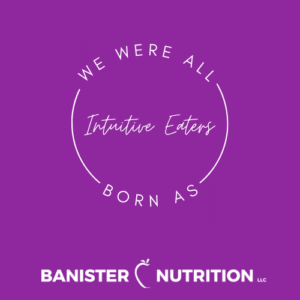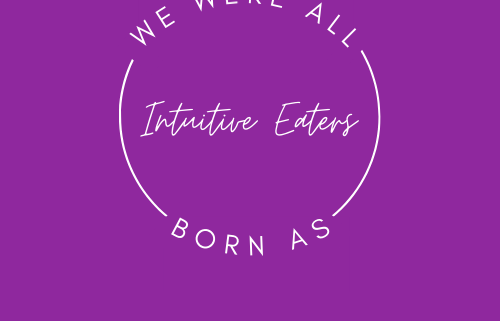We Were All Born As Intuitive Eaters

Did you know the “non-dieting” approach has been around since 1995? Evelyn Tribole, MS, RD and Elyse Resch MS, RD, CEDRD, FADA were the first to develop and publish this concept in their book, Intuitive Eating: The Revolutionary Program that Works. Intuitive eating is not a diet, but an approach to improve your relationship with food, exercise, and body image. Through this, studies have shown this method can additionally help improve blood pressure, cholesterol, decrease depression, enhance self-esteem and often result in weight loss for chronic dieters. Information below is a highlight of each principle and directly from the Intuitive Eating book:
PRINCIPLE 1: |
| REJECT THE DIET MENTALITY
Throw out the diet books and magazine articles that offer you the false hope of losing weight quickly, easily, and permanently. Get angry at the lies that have led you to feel as if you were a failure every time a new diet stopped working and you gained back all the weight. If you allow even one small hope to linger that a new and better diet might be lurking around the corner, it will prevent you from being free to rediscover Intuitive Eating. |
PRINCIPLE 2: |
| HONOR YOUR HUNGER
Keep your body biologically fed with adequate energy and carbohydrates. Otherwise, you can trigger a primal drive to overeat. Once you reach the moment of excessive hunger, all intentions of moderate, conscious eating are fleeting and irrelevant. Learning to honor this first biological signal sets the stage for rebuilding trust with yourself and food. |
PRINCIPLE 3: |
| MAKE PEACE WITH FOOD
Call a truce; stop the food fight! Give yourself unconditional permission to eat. If you tell yourself that you can’t or shouldn’t have a particular food, it can lead to intense feelings of deprivation that build into uncontrollable cravings and, often, bingeing. When you finally “give in” to your forbidden foods, eating will be experienced with such intensity, it usually results in Last Supper overeating and overwhelming guilt. |
PRINCIPLE 4: |
| CHALLENGE THE FOOD POLICE
Scream a loud “no” to thoughts in your head that declare you’re “good” for eating under a thousand calories or “bad” because you ate a piece of chocolate cake. The food police monitor the unreasonable rules that dieting has created. The police station is housed deep in your psyche, and its loud speaker shouts negative barbs, hopeless phrases, and guilt-provoking indictments. Chasing the food police away is a critical step in returning to Intuitive Eating. |
PRINCIPLE 5: |
| FEEL YOUR FULLNESS
Listen for the body signals that tell you that you are no longer hungry. Observe the signs that show that you’re comfortably full. Pause in the middle of a meal or snack and ask yourself how the food tastes, and what your current fullness level is. |
PRINCIPLE 6: |
| DISCOVER THE SATISFACTION FACTOR
The Japanese have the wisdom to keep pleasure as one of their goals of healthy living. In our fury to be thin and healthy, we often overlook one of the most basic gifts of existence – the pleasure and satisfaction that can be found in the eating experience. When you eat what you really want, in an environment that is inviting, the pleasure you derive will be a powerful force in helping you feel satisfied and content. By providing this experience for yourself, you will find that it takes much less food to decide you’ve had “enough.” |
PRINCIPLE 7: |
| COPE WITH YOUR EMOTIONS WITHOUT USING FOOD
Find ways to comfort, nurture, distract, and resolve your emotional issues without using food. Anxiety, loneliness, boredom, and anger are emotions we all experience throughout life. Each has its own trigger, and each has its own appeasement. Food won’t fix any of these feelings. It may provide comfort for the short term, distract from the pain, or even numb you into a food hangover. But food won’t solve the problem. If anything, eating for an emotional hunger will only make you feel worse in the long run. You’ll ultimately have to deal with the source of the emotion, as well as the discomfort of overeating. |
PRINCIPLE 8: |
| RESPECT YOUR BODY
Accept your genetic blueprint. Just as a person with a shoe size of eight would not expect realistically to squeeze into a size six, it is equally futile (and uncomfortable) to have a similar expectation about body size. Respect your body, so you can feel better about who you are. It’s hard to reject the diet mentality if you are unrealistic and overly critical of your body shape. |
PRINCIPLE 9: |
| EXERCISE – FEEL THE DIFFERENCE
Forget militant exercise. Just get active and feel the difference. Shift your focus to how it feels to move your body, rather than the calorie burning effect of exercise. If you focus on how you feel from working out, like being energized, it can make the difference between rolling out of bed for a brisk morning walk or hitting the booze alarm. If when you wake up, your only goal is to lose weight, it’s usually not a motivating factor in that moment of time. |
PRINCIPLE 10: |
| HONOR YOUR HEALTH – GENTLE NUTRITION
Make food choices that honor your health and taste buds while making you feel good. Remember that you don’t have to eat a perfect diet to be healthy. You will not suddenly get a nutrient deficiency, or gain weight from one snack, one meal, or one day of eating. It’s what you eat consistently over time that matters. Progress, not perfection, is what counts. |
This book is a great read! If you are wanting to implement these principles in your life, and would like guidance/one-on-one counseling, the “BN” Dietitians are in your corner. We understand the role diet culture has played on one’s mind and body. Get back to the basics and learn to listen to YOU! LN









